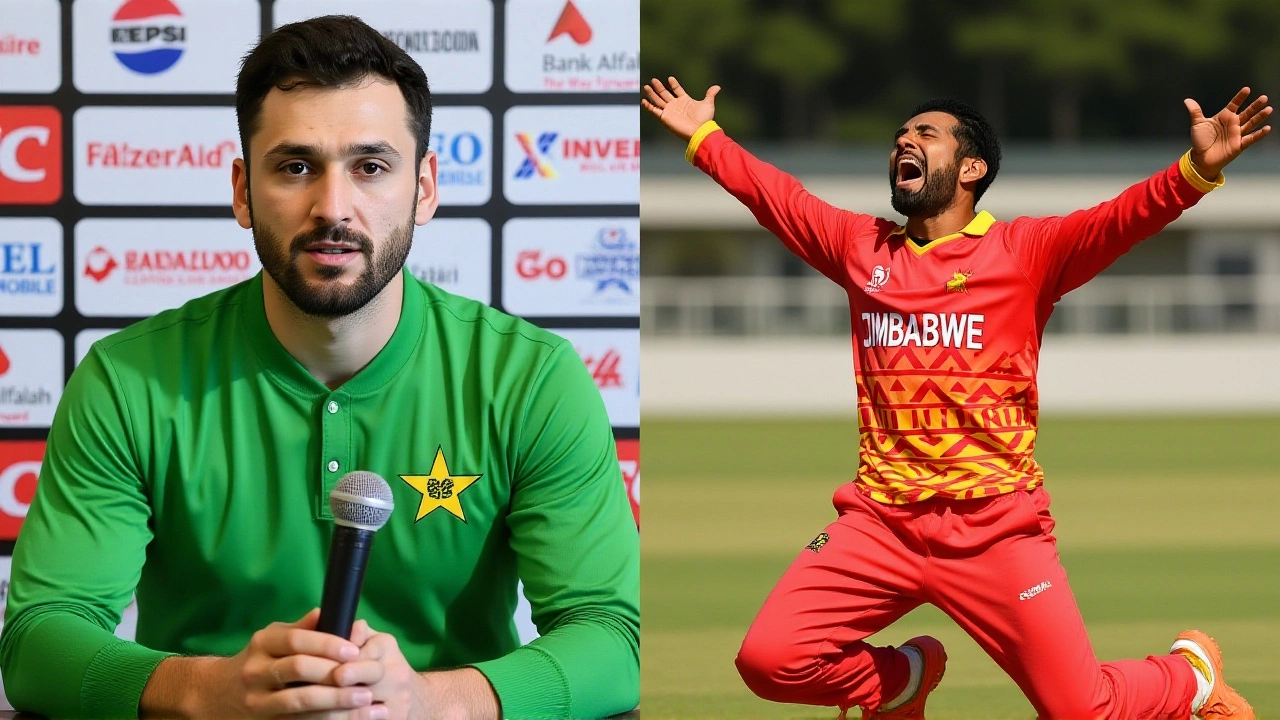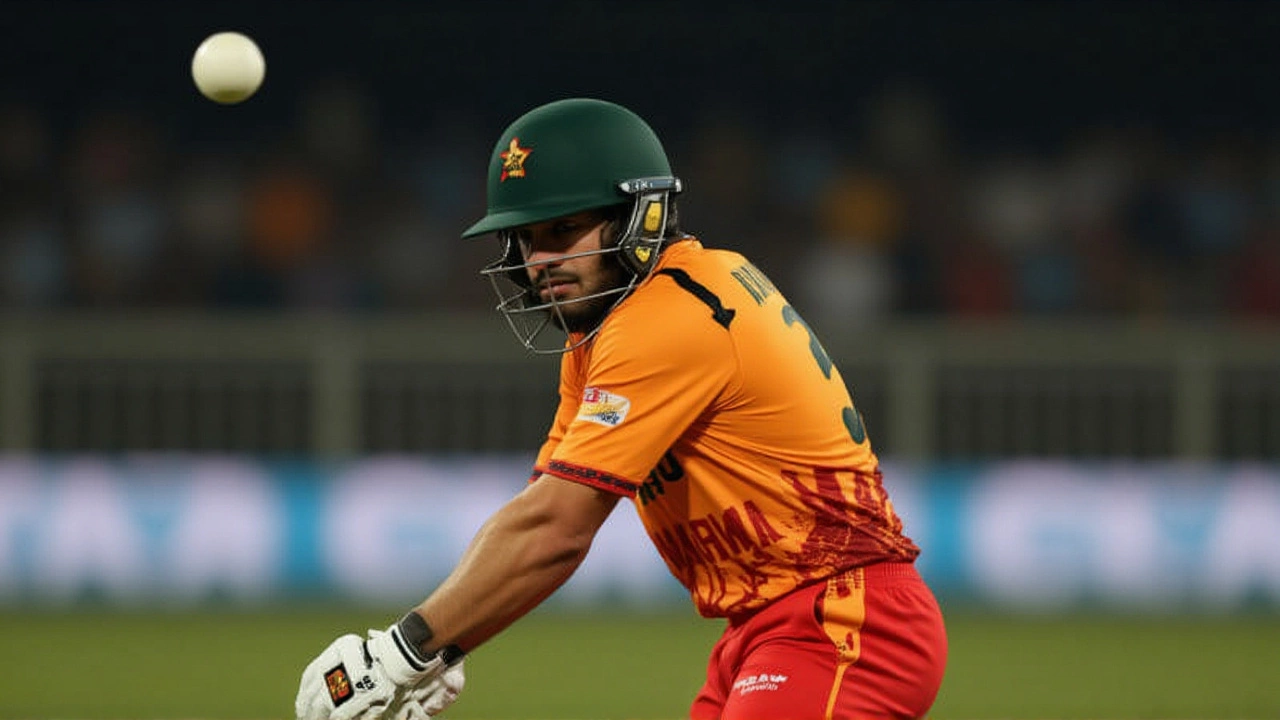When Zimbabwe Cricket took the field against Sri Lanka Cricket on Thursday, November 21, 2024, few expected the historic collapse that followed. But in Rawalpindi, under the floodlights of the Rawalpindi Cricket Stadium, Zimbabwe didn’t just win—they rewrote the record books. The Zimbabwe national cricket team bowled out Sri Lanka for 95 in 16.4 overs, securing their largest-ever T20I victory over their opponents by 67 runs. It wasn’t luck. It was execution. And it came at a time when Sri Lanka’s cricketing identity seemed to be unraveling.
Building a Total Against the Odds
Sent in to bat first, Zimbabwe’s innings began with quiet uncertainty. Opening batsman Brian Bennett steadied the ship with a composed 49 off 42 balls—five fours, a six, and a calmness that belied the pressure of a team fighting for relevance. His partner, Tadiwanashe Marumani, fell early, but Bennett didn’t panic. Enter Sikandar Raza, captain and all-rounder, who arrived at the crease with the score at 37-1 and turned the tide. In just 32 balls, he smashed 47 runs, mixing powerful pulls with precise placement. Their 61-run partnership was the backbone of Zimbabwe’s 162-8. The final five overs exploded for 46 runs, a deliberate shift from cautious accumulation to controlled aggression—a strategy that would haunt Sri Lanka later.The Bowling Masterclass That Broke Sri Lanka
If Zimbabwe’s batting was disciplined, their bowling was surgical. All six bowlers took wickets—a rare feat in T20Is—and none more devastating than Brad Evans. The fast bowler, who had flown under the radar before this series, delivered a spell for the ages: 4 overs, 3 wickets, 9 runs. His first over, in the powerplay, dismissed Pathum Nissanka for a duck and Kusal Perera for 12, leaving Sri Lanka reeling at 25-2. That was the slowest powerplay score in any T20I match in 2024. The damage was done before the 7th over. Richard Ngarava added two crucial wickets for 15 runs, while spinners kept the pressure relentless. Sri Lanka’s innings never recovered. Captain Dasun Shanaka, who had fought hard in the ODI series, tried to salvage pride with a fiery 34 off 25 balls. But his lofted shot to long-off, caught by Raza in a spectacular diving effort, symbolized the collapse. Wanindu Hasaranga, Sri Lanka’s lone bright spot with 3 wickets, couldn’t carry the team alone. The scoreboard read 95 all out. The stadium fell silent.
Why This Victory Matters
Zimbabwe, a team often dismissed as an underdog, has historically struggled against full-member nations. This win—their biggest ever over Sri Lanka in T20Is—shatters that narrative. It’s not just about runs or wickets. It’s about belief. After losing their opener to hosts Pakistan by just 12 runs, this performance proved they could compete with the best. Raza’s post-match quote cut to the core: “You want to be there when the chips are down and be prepared to do the dirty work for the team. If I’m trying, I feel my team is going to try.” For Sri Lanka, it’s a crisis. Coming off a 3-0 ODI series loss to Pakistan, this T20I defeat was a public unraveling. Commentators didn’t hold back. “Sri Lanka forgot cricket exists,” one noted. Their batting lineup, once feared for its flair, now looks brittle. The absence of Angelo Mathews and the inconsistent form of their top order have exposed a deeper malaise. Even their spinners, traditionally their strength, couldn’t stop the bleeding.What Comes Next
The Pakistan Tri-Nation Twenty20 SeriesRawalpindi Cricket Stadium continues on Saturday, November 23, with Sri Lanka facing Pakistan. For Sri Lanka, it’s survival. For Zimbabwe, it’s momentum. Raza and Bennett will be watched closely—not just for their stats, but for how they lead a team rewriting its future. The Pakistan Cricket Board, hosting the series from their 15,000-seat Rawalpindi venue, now has a compelling narrative: a rising force challenging tradition. Zimbabwe’s players, once labeled as underdogs, are now the story.
Behind the Numbers
- Zimbabwe’s 162-8 was their highest T20I total against Sri Lanka.- Sri Lanka’s 95 is their lowest T20I score in 2024.
- Brad Evans’ 3/9 is the best bowling figures by a Zimbabwean in T20Is against Sri Lanka.
- The 67-run margin surpasses Zimbabwe’s previous best win over Sri Lanka (56 runs in 2018).
- Sri Lanka has lost five of their last six T20Is across formats since September 2024.
Frequently Asked Questions
How significant is Zimbabwe’s 67-run win over Sri Lanka in T20I history?
This is Zimbabwe’s largest-ever victory margin over Sri Lanka in T20 Internationals, surpassing their previous best of 56 runs in 2018. It’s also the first time Zimbabwe has bowled Sri Lanka out for under 100 in a T20I since 2012. The win boosts Zimbabwe’s ranking and proves they can compete with established teams on their own terms.
Why did Sri Lanka’s batting collapse so badly?
Sri Lanka’s top order failed to adapt to Zimbabwe’s disciplined line and length. The powerplay collapse—25-2 in 4 overs—was their slowest of 2024. Their middle order, lacking experience under pressure, panicked. Even Dasun Shanaka’s late cameo couldn’t compensate for the early losses. The team’s reliance on a few stars, without depth, was exposed.
What role did Brad Evans play in Zimbabwe’s victory?
Brad Evans was the game’s defining performer. His 3/9 in four overs, including the key wickets of Nissanka and Perera, shattered Sri Lanka’s momentum early. His accuracy under pressure, combined with clever variations, made him unplayable. It’s his best T20I figures against Sri Lanka and the best by any Zimbabwean bowler in that matchup.
How has Zimbabwe’s team changed to achieve this result?
Zimbabwe has shifted from relying on individual brilliance to structured, team-based cricket. Players like Bennett and Raza show leadership, while younger bowlers like Evans and Ngarava are stepping up. The team’s fitness and fielding standards have improved dramatically since 2023, and their aggressive finishers now execute under pressure—something they struggled with in past tournaments.
What does this mean for Sri Lanka’s future in international cricket?
This defeat deepens concerns about Sri Lanka’s transition phase. With legends retired and young players untested under pressure, their batting depth is a major issue. If they don’t rebuild their middle order and improve powerplay discipline, they risk slipping further in ICC rankings. Their next series against Pakistan will be a litmus test for their recovery.
Is this win a sign of Zimbabwe’s resurgence in world cricket?
Absolutely. This isn’t a fluke—it’s the result of consistent development since 2022. Zimbabwe’s recent wins over Bangladesh and this performance against Sri Lanka show they’re no longer just competitive; they’re capable of dominating. With Raza leading and young talent emerging, Zimbabwe could challenge for T20 World Cup qualification in 2026.
